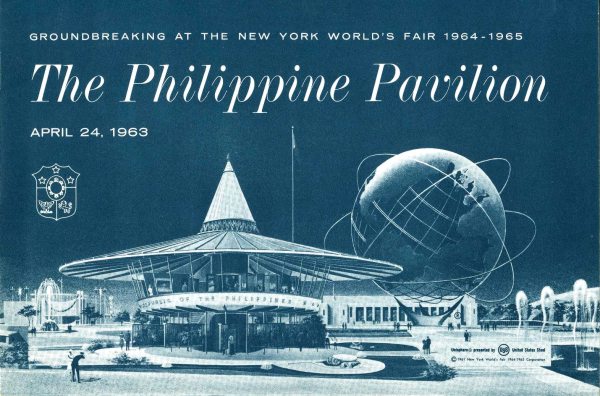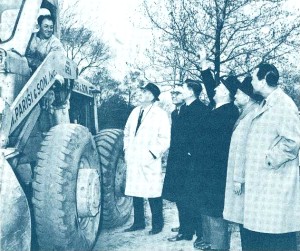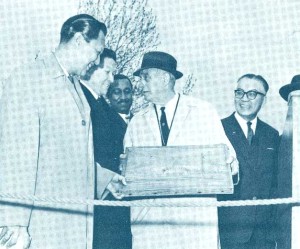|
Cover: Architect Otilio Arellano's rendering of the Philippine
Pavilion, showing its proximity to the Unisphere.
 |
SOURCE: Groundbreaking
Brochure, The Pavilion of the Philippines
|
Excerpts from
transcription of remarks by Philippine and World's Fair officials
at Philippine Pavilion groundbreaking ceremonies, New York World's
Fair, Wednesday, April 24, 1963.
RICHARD C. PATTERSON,
JR. [Chief of Protocol]: Distinguished guest, ladies and gentlemen.
The bond of friendship that has existed between our country and
the Philippines is a strong one, and no event of such magnitude
as this World's Fair would be complete without the participation
of this staunch and devoted friend and ally. Our first speaker
is the dynamic vice president of the New York World's Fair, in
charge of International Affairs, Governor Charles Poletti.
GOVERNOR CHARLES
POLETTI: Thank you Ambassador Patterson. Mr. Vice President,
Ambassador Mutuc, Mr. Consul General, ladies and gentlemen. Of
all the countries that Mrs. Poletti and I have visited, nowhere
did we encounter more cordiality than in the Philippines.
This is a moment
of joy and jubilation and we are delighted that we will have
not only Philippine participation, but a demonstration of its
dynamic growth. I am sure that the millions of people who will
come to this Fair will profit by learning all about the people
of the Philippines, and about the tremendous future that lies
ahead for the sturdy people of those islands. Thank you.
RICHARD PATTERSON:.
Thank you Governor Poletti. Our next speaker is the distinguished
Commissioner General of the Philippines to the New York World's
Fair, Mr. Domingo Arcega.
MR. DOMINGO ARCEGA:
Ambassador Patterson, Mr. Moses, Governor Poletti, Vice President
Pelaez, Ambassador Mutuc, Consul General Umayam, fellow countrymen,
ladies and gentlemen. On this historic occasion allow me first
the privilege of reading to you the message of our Secretary
of the Department of Commerce and Industry, "I join the
Filipino people in celebrating the groundbreaking ceremony for
the Philippine Pavilion in the New York World's Fair 1964-1965.
Philippine participation in this international Fair is designed
not only to promote social and economic interest, it is a manifestation
of a burning desire to make common cause with other nations of
the world in bring about lasting peace for all mankind.
"The Philippine
Pavilion will not merely be a structure of wood and concrete.
Above all, it will symbolize the efforts of a courageous people
to face the mighty challenge of a great age. It will stand as
a repository of the nation's work and culture, for all the world
to see, and use in the cause of peace.
"On this
occasion I hope that all segments of our population will contribute
their share in making Philippine participation in this World's
Fair a great success. -- signed, Rufino G. Hechanova."
|
Giving
the official signal to break ground for the Philippine Pavilion:
(left to right) Robert Moses, Fair president, Amelito Mutuc, Philippines
Ambassador, Emanuel Pelaez, Vice President of the Philippines,
Governor Charles Poletti, vice president of the Fair's International
Affairs and Exhibits, Bartolome Umayam, Minister and Consul General
of the Philippines and Domingo Arcega, Commissioner General of
Philippine Participation at the Fair.
 |
|
Seventeen years
ago several thousands of my countrymen and I watched with misty
eyes as the Philippine flag was raised to replace the American
flag in proclamation of our independence and the emergence of
the Philippines as a separate nation. After the bitterness of
that last global conflict, after losing lives and shedding blood
in the lonely bastions of Bataan and Corregidor, we acknowledged
the resounding ovation of the democratic world. The world took
notice of our country and our people as defenders of democracy
and lovers of peace.
When peace was
restored, victorious and defeated nations alike moved with ambition
and determination to gain what they had lost. In the rush of
rehabilitation and progress, a young nation such as ours was
lost again in the turmoil of industrial and ideological warfare.
But over and above this cold war, we have a strong conviction
that God has given us our beloved land to preserve and to love,
that we as a people deserve a rightful place under the sun, and
that young as we are, we are competent and capable of staying
among the brotherhood of nations.
|
|
As we break ground
to begin construction of the Philippine Pavilion, we convey to
all of you who are here, and to the rest of the world, that on
this site will rise a true symbol of democracy, an image of a
God-loving people who will fight and die for freedom and universal
peace.
In conclusion,
permit me to have the honor and distinct privilege to read the
message of our beloved President of the Republic of the Philippines:
"The New York World's Fair will serve as an effective instrument
in forging closer ties of friendship among the peoples of the
world. This can be gathered from the theme of this Fair, Peace
through Understanding. Those who participate in this Fair will
enable others to learn about the ways of life and the basic ideas
of the peoples of these countries. I thus consider it an honor
to take part in this World's Fair and to be able to make a contribution
to peace, by enabling others to learn about the Filipino way
of life, Signed Diosadado Macapagal, President of the Philippines."
|
| RICHARD PATTERSON:.
Thank you Mr. Commissioner General. I'd like to read to you a
telegram addressed to the Honorable Robert Moses: "I regret
that previous commitments with American state universities prevent
my participating in the groundbreaking for our Philippine Pavilion.
The president of the Philippines deserves the highest praise
for his decision to have our country adequately represented in
this World's Fair. New York City, very properly, is holding an
event that will be a valuable contribution to world peace. For
us in the Philippines, it will give us an opportunity to project
to the world our maturing democracy and our achievements. As
a people dedicated to the democratic way of life, please accept
my best wishes for the success of the Fair, which under your
leadership, Mr. Moses, I have no doubt will be another milestone
in the history of this incomparable city. Signed: Carlos P. Romulo,
president of the University of the Philippines." |
Domingo
Arcega, Commissioner General of Philippine Participation at the
World's Fair, presents Robert Moses, Fair president, with a souvenir
of Philippine craftsmanship. Between them looking on, from left
to right, Emanuel Pelaez, Vice President of the Republic of the
Philippines and Dr. George H. Bennett of the Fair. At right, Amelito
Mutuc, Philippines Ambassador to the United States.
 |
|
|
Now ladies and
gentlemen, I should like to present for a bow a very distinguished
Philippine scholar and diplomat. His knowledge of America, gained
through his diplomatic work in this country, justly qualifies
him for the important position he now holds. He is the Consul
General of the Philippines in New York City, the Honorable Barolome
Umayam.
Our next speaker
is an eminent layer and brilliant diplomat, who received his
law degree at Harvard University. He has held innumerable posts
of high distinction and until recently held a cabinet post as
Executive Secretary. I have the honor to present to you the Philippine
Ambassador to the United States, His Excellence, Amelito Mutuc.
THE HONORABLE
AMELITO R. MUTUC:. It is a singular pleasure for me to participate
in this groundbreaking ceremony of the Philippine Pavilion at
the New York World's Fair.
The concept of
world fairs has an international cast because it brings together
the nations and peoples of the globe, enabling them to achieve
closer contacts and understanding of one another's culture, progress
and achievements.
|
 |
|
This ceremony
is much more significant, I feel, because this particular World's
fair is the result of the collective endeavor and thinking of
private citizens. It discloses what every individual can do to
promote the brotherhood of man.
Our participation,
in material terms, is both modest and humble. Let me assure you,
however, that with it goes the wish of my country and people
to show the salient points of their past, their heritage, and
their progress. With it goes the desire of our people, under
the leadership of President Diosdado Macapagal, to help foster
world peace and brotherhood among men.
The Philippines
profoundly believes in making its contribution, no matter how
small, toward hastening the emergence of peace and understanding
in our time.
RICHARD PATTERSON:
Thank you Mr. Ambassador. Our next speaker is a renowned scholar
and an outstanding diplomat. A former professor of law at various
leading universities, he was on the Philippine delegation to
the Afro-Asian Conference in Indonesia in 1956. He was acting
chairman of his country's delegation to the United Nations General
Assembly in 1957. Permit me to introduce the Vice President of
the Philippines, and concurrently Secretary for Foreign Affairs,
his Excellency Emanuel Pelaez.
HIS EXCELLENCY
EMANUEL PELAEZ: Mr. Moses, my fellow Vice President Governor
Poletti, Ambassador Patterson, Ambassador Mutuc, Consul Umayam,
Mr. Arcega, ladies and gentlemen. Next spring peoples from all
over the world will come here to witness the latest achievements
of man on a shrinking globe and an expanding universe, to borrow
a phrase used in this Fair's brochures. We shall realize once
more what we so often forget that it is only man -- with his
ideas, his inventions, his discoveries, his achievements, his
manipulation of nature -- who can create peace, and thereby bring
human development into full and fine flower. But this is a gigantic
task in which all nations of the earth must participate. For
the variety and range of man's creation is indeed infinite.
As we lay the
cornerstone of the Philippine Pavilion this afternoon, we would
like to take cognizance of the modest but active growth the Philippines
has played and will continue to play in world peace, and of her
contributions to world culture. In this pavilion we hope to show
the latest achievements and directions of Philippine talent and
genius. The present day position of the Philippines is, if I
may say so, particularly interesting in terms of world peace.
We are a medium-sized country, well on its way to national development.
We are an agricultural nation trying to achieve the maximum of
industrialization. We are bringing into play our enterprise,
our vigor and our imagination. I think we have proven that given
the opportunity, a free people can transform their country. However
in our desire for greater organization, for technology, specialization
and modernization, we hope that we shall not lose those qualities
which we have always had, which have always made life gracious
for us, such as delicacy, gaiety, charm, spontaneity, hospitality,
sincerity.
We are deeply
grateful to the authorities of New York City and to the authorities
managing this Fair for making it possible for us to project in
a modest way the image of our country, not only to the American
people but to the peoples of the earth who will participate in
this Fair. We would like to say that we realize the tremendous
importance of this Fair, not only in terms of commerce, of trade
or industry, but even more in terms of international understanding.
We shall do our modest bit to help reach that goal.
RICHARD PATTERSON:
Thank you Mr. Vice President Pelaez. I now present the president
of the New York World's Fair, the Honorable Robert Moses.
ROBERT MOSES:
We have a pretty good record, I think, in the Philippines. We
are not a colonial nation. I think our friends here will agree
that we have sent our very best talent to the Philippines from
the very beginning, since the Spanish-American War, to help them
establish a free nation of their own. Now that isn't a small
thing. I notice that it is in the temper of the times, and you
hear it very often in the United Nations and in diplomatic circles,
to pretend that it's an easy thing to set up a new republic.
It isn't. It's a very difficult thing.
It all depends
upon the kind of people who are running the show. In the Philippines,
they've had some real statesmen. They've been in existence long
enough, as a Republic, to persuade the world that they are there
for good. They have succeeded in establishing something which
is much more than a dream. They are our firmest and best advocates
and friends in the Far East. For that and many other reasons,
we are simply delighted to have them here. Thank you.
|
|